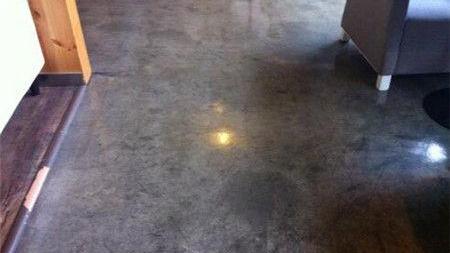5 Top Advantages Of Epoxy Floors For Garage Doors

Epoxy floors are applied for both commercial and residential garage and shop floors to give your floor that shiny appearance to draw the attention. Contingent on the application you select, you have a choice between various understated solid hues and colors, and you can choose custom blends and colors of flakes to match your style perfectly.
Durable
The thick and hardened application that epoxy gives as a coating provides you with a resilient and sustainable choice that can withstand chipping, impacts, chemicals, surface abrasion, and stains. You don’t have to be stressed about damaging the floor if you accidentally drop your wrench or your bicycle falls over.
Covering Minor Scratches
The thicker coating also covers minor imperfections like small flaws or spider cracks in the concrete. Since epoxy coating is a topical sealer, it is anti-dusting and prevents concrete dust from collecting on tool benches, cars, and storage items.
Moisture Resilient
An epoxy floor is a natural moisture-resistant application, which is highly beneficial for individuals living in snowy climates. The floor is easily cleaned when road salts or icy brines collect during the winter. All it takes is a bit of mild soap and a broom or mop can be used for debris and dust.
Anti-Slipping
Depending on whether you’ve added colored acrylic flakes to your floor or the kind of topcoat utilized, some surfaces may be slippery when they get wet. People who stay in drier climates usually don’t have an issue. But, if you require additional grip, a slip-resistant aggregate can be added to the final coat to make it a non-skid surface.
Chemical And Stain-Resistant
Epoxy flooring is an ideal choice for hobbyists and home mechanics alike since it is stain and chemical-resistant. Brake fluids, gasoline, oil, and other caustic chemicals can be wiped up quickly even if it’s been there for a while. Jacks, rolling toolboxes, and jack stand will not damage the floor either.
Disadvantages Of Epoxy Floors
- Despite the toughness of this floor covering, it is not resilient to everything. Welding can be hard on epoxy since it may create burn marks from hot slag that falls onto it. It is not the perfect choice for floors that have moisture problems. The degree of moisture vapor transmission from under the slab can lead epoxy to delaminate if it is too elevated.
- Hot tire pick up can be an issue too when the hot tires of your car can soften inferior quality coatings. Once the tires cooled down it, contract and can lead to the tire tread grabbing and pulling at the surface of the still lenient coating. It can cause the epoxy to delaminate when the tire pulls it up from the floor. This, however, is more of an issue with store-bought epoxy kits since they are generally water-based coating, which is not 100% solid epoxy and are only 3mils thick in comparison to professionally installed solid epoxy coatings which are ten mils thick or more. Professionally installed epoxy floors can have warranties of up to fifteen years or more, making it a long-lasting and durable application altogether.
More to Read:
Previous Posts:










